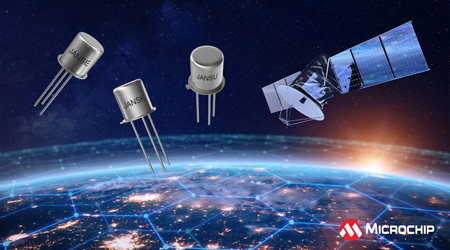The Joint Army Navy (JAN) transistors tested up to 100 Krad at 10 mrad per second

June 21, 2024 — In the United States, the Defense Logistics Agency (DLA) manages the global defense supply chain and works with suppliers to ensure high reliability of all the components that go into an end application. Integral to the manufacturing process of components designed for military applications are rigorous tests and compliance standards that must be met to make it on the Quality Products List (QPL), which guarantees a certain level of reliability and streamlines the procurement process. As a leading supplier to the aerospace and defense market, Microchip Technology (Nasdaq: MCHP) announces its portfolio of JAN transistors is now tested and qualified to Military-Standard Enhanced Low Dose Radiation Sensitivity (ELDRS) requirements including MIL-STD-750, Test Method 1019 and specifications such as MIL-PRF-19500/255, /291, /355, /376 and /391.
These military-grade transistors have been manufactured to withstand varying levels of radiation exposure and are part of the Joint Army Navy (JAN) designation system used to specify components procured for military applications. These designations ensure that electronic components used in critical military and aerospace applications can operate reliably in radiation-rich environments.
JAN Transistor Designations
• JANSE Transistors (30 Krad): Withstand up to 30 Krad per unit of absorbed radiation dose
• JANSK Transistors (50 Krad): Withstand higher levels of radiation, up to 50 Krad
• JANSU Transistors (100 Krad): The most radiation-resistant among these families, capable of enduring up to 100 Krad
Microchip’s legacy in aerospace and defense spans 60 years, with fabs dedicated to aerospace and defense semiconductor manufacturing and testing. The company’s fab in Ennis, Ireland, is a robust MIL-PRF-19500 screening and reliability testing facility. Microchip’s fab in Lawrence, Massachusetts, is DLA Certified with the capability to conduct in-house ELDRS to MIL-STD-750, Test Method 1019. Microchip provides the flexibility for customers to test to the designated Radiation Hardness Assurance (RHA) level depending on the program needs for the components and end application.
“Through rigorous in-house testing at our Ennis and Lawrence facilities, our products are certified to operate with high performance and high reliability in harsh environments,” said Leon Gross, vice president of Microchip’s discrete products group. “We are committed to developing and manufacturing products that ease the design process based on our customers’ specific requirements. Microchip was the first company to provide Total Ionizing Dose (TID) rated Radiation-Hardened Bipolar Junction Transistors (BJTs); now, we worked closely with the DLA to add testing for ELDRS characterization.”
Microchip has a broad portfolio of high-reliability solutions designed for the aerospace and defense market including Radiation-Tolerant (RT) and Radiation-Hardened (RH) MCUs, FPGAs and Ethernet PHYs, power devices, RF products, timing solutions, as well as discrete components from bare die to system modules. Additionally, Microchip offers a wide range of components on the QPL to better serve its customers. To learn more about Microchip’s aerospace and defense solutions, visit the website.
Resources and Support
The new families of JAN transistors are supported by comprehensive analysis, test reports and detailed data sheets.
Pricing and Availability
The families of JANSE (30 Krad), JANSK (50 Krad) and JANSU (100 Krad) transistors are now available. For additional information and to purchase, contact a Microchip sales representative, authorized worldwide distributor or visit Microchip’s Purchasing and Client Services website, www.microchipdirect.com.
Resources
High-res images available through Flickr or editorial contact (feel free to publish):
• Application image: www.flickr.com/photos/microchiptechnology/53744134673/sizes/l






